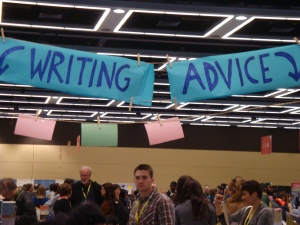Most writers need feedback about their work – some more than others. Ray Bradbury, for example, was not only a highly motivated and prolific writer, but also a ferocious reviser without need for advance readers. He was disciplined in his writing process and daring. He said, “When you write – explode – fly apart – disintegrate! Then give yourself enough time to think, cut, rework, and rewrite.” If and when he did show his work to others before publication, he had already logged double-digit revisions.
But, most of the rest of us earthling writers need support and encouragement along the road to the finished product. There are those writers who show their manuscript to no one until they think it’s ready for publication, but often, when I’m still revising, I like a nudge now and then from a carefully chosen reader who will be honest enough to say that they have no sense of what I’m trying to say, or they lost interest after the first paragraph, or they just couldn’t figure out what my characters were trying to do. This usually happens when I don’t know what I’m trying to say and I’ve wandered off into a thicket of ideas. My reader is not going to tell me what to do or how to find my way, however they might offer a clue or notice that there is too much of something and not enough of something else. Perhaps I won’t agree with my helpful reader – but I was the one who asked! Now I can decide if and how I’ll revise.
Something mysterious happens, though, when a friend asks me to read their work. Suddenly, in spite of having critiqued many manuscripts, I doubt my ability to be clear and worry that I might not have anything useful to say. What if I’m too critical? What if I don’t like it?!! Will I be un-friended and crossed off the invitation list when I hand over my feedback? This is when I stop and remind myself that the first rule of critiquing the work of someone else is to approach with solid questions and good will. My questions have changed over the course of years of reading, but here are some of the latest:
What is the major theme of the story or essay?
Were there any places along the way that seemed like distractions from the theme? Was it okay to be distracted?
Was I curious to read more after the first sentence? The first paragraph? The first page? Why?
How is the writer using scenes, exposition and dialogue to tell the story?
How is the pace and flow of the story relative to the theme?
Where in the story do I feel the writer’s strengths?
How did I feel after I finished reading?
Does the writer seem to be enjoying him/herself? Am I enjoying the reading?
About the timing of asking for feedback, I recommend working through several drafts before requesting a read-through by a friend – and don’t be surprised if even a practiced reader thinks that it might be a first draft rather than the result of many attempts.
One of the great luxuries during my MFA program in nonfiction writing was having a different mentor each semester, each with their own style of critique. Some gave general comments and some made line edits on the page, but each glance offered nourishment – a different vitamin – along the path to deepening my awareness of what and how I was writing. Perhaps the most helpful of all the comments I’ve ever received was when a reader said, “You don’t seem to be having any fun with this story.”
Ray Bradbury was right. Explode on the page first, take risks, rewrite – and then maybe ask a friend for feedback. You’ll at least find out if you’re having a good time.

